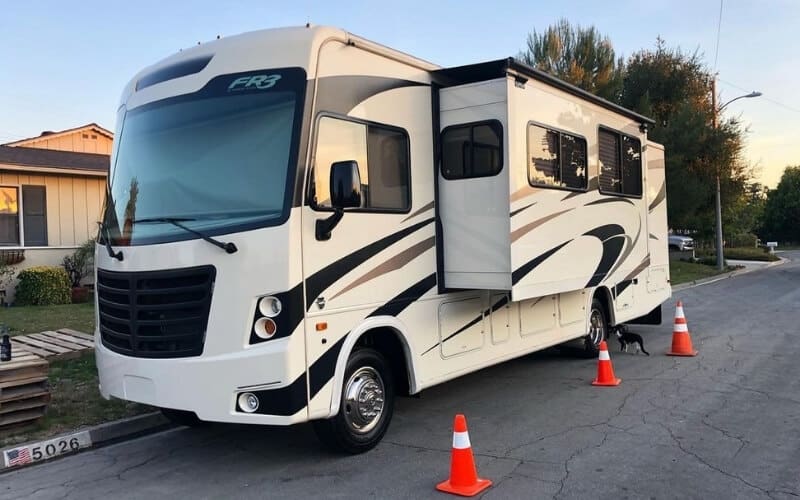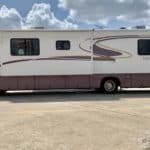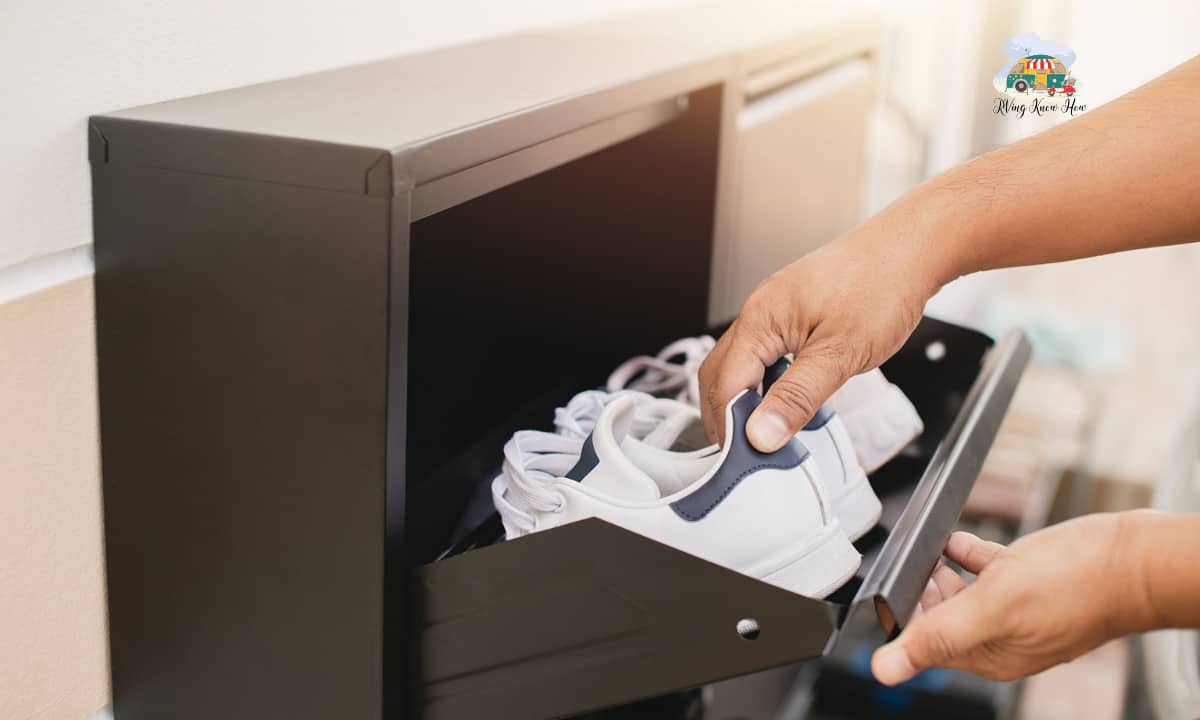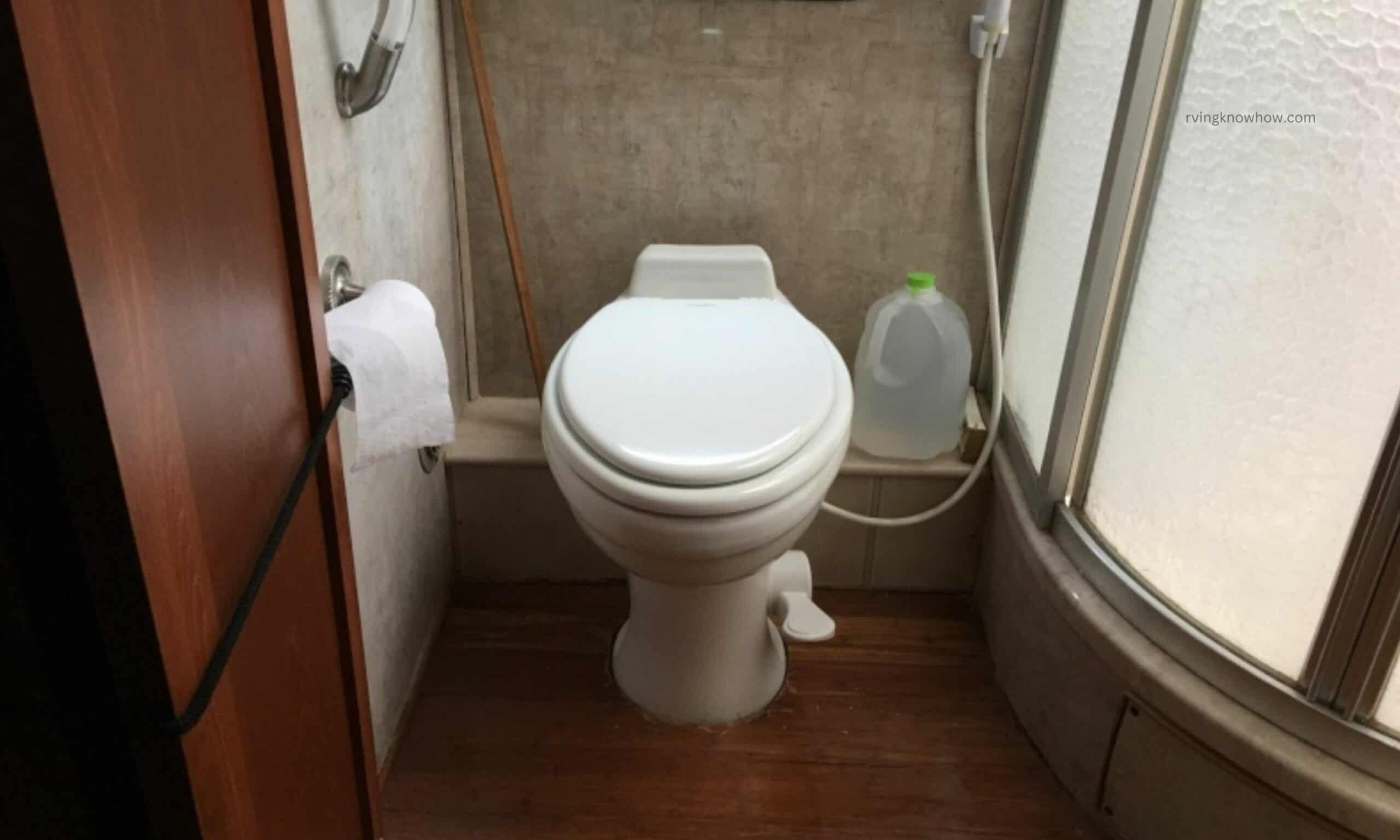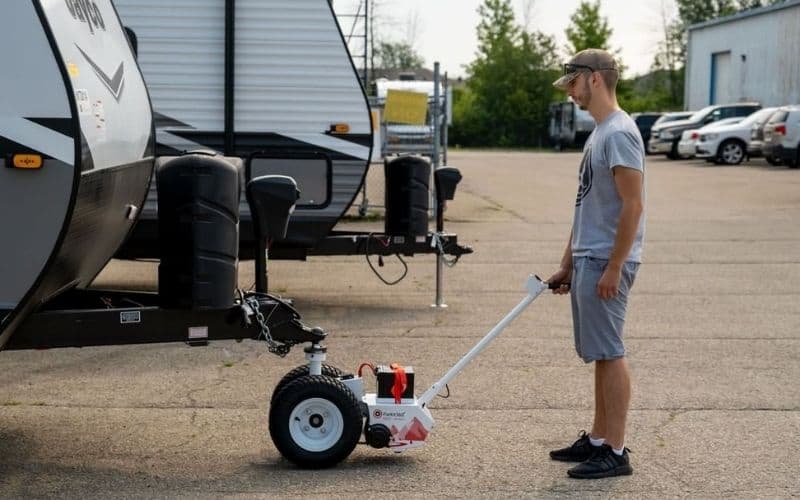Whether you’re a full-time RVer or a person who camps seasonally, figuring out where to park your RV in the off times is an important question.
RV storage units can range in price from $100-$400 per month.
Which begs the question: Can you park an RV trailer in my driveway?
The answer is yes, you can park your RV in your driveway. But, it is important to understand variables like the length of your camper, amount of time you can park your travel trailer in your driveway, and rules for motorized vs. non-motorized RVs before parking your RV in your driveway. Each city or state has its own laws and regulations regarding parking RVs However, it’s usually illegal to park an RV on public streets overnight or for more extended periods.
This article will walk you through all the important things to consider when parking your travel trailer in your driveway.
There Can Be Different Parking Rules for Motorized Versus Non-Motorized RVs
Depending on the city/state where you live, you might face different rules for parking non-motorized versus motorized RVs in your driveway.
For example, some cities are very strict and won’t allow you to park a non-motorized travel trailer in your driveway unless it’s attached to a motorized vehicle.
And even though some cities allow you to park a motorized RV in your driveway, they will often put limits on how long your rig can be.
We’ve seen some cities that don’t allow anything longer than 20ft to be parked in a driveway, which eliminates most RVs!
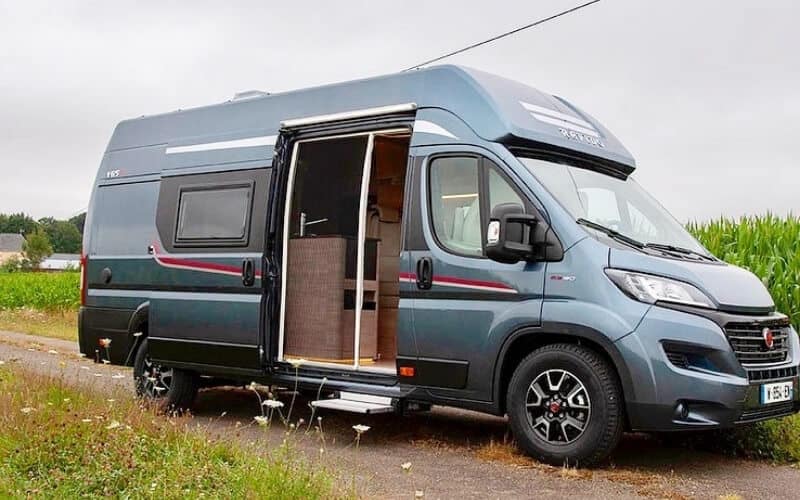
How Long You Can Park Your Travel Trailer in Your Driveway?
Some cities and HOAs won’t let you have a travel trailer in your driveway for more than 24 hours while others will let you park it there as long as you want.
That’s why it’s important to call both your HOA (if you have one) and the city you live in to see what the rules are.
Make Sure Your RV Isn’t Longer than The Law Allows
Some cities and HOAs won’t allow you to park a travel trailer in your driveway if it is above a certain length.
Sometimes the maximum length will be 40ft or more, meaning that many travel trailers will fit within the law.
But many cities heavily restrict the length of a travel trailer that you can park in your driveway, making it tough for you to store your camper in your driveway.
That’s why it’s important to ask your city and HOA about the maximum length allowed for a travel trailer parked in your driveway.
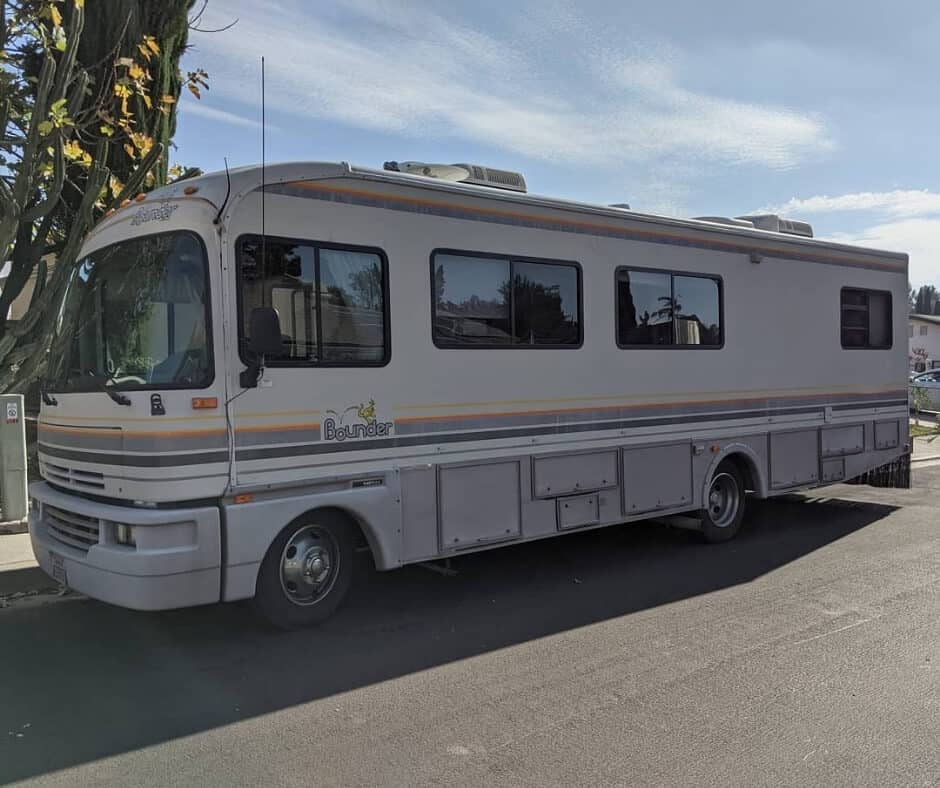
Why park your RV in your driveway?
The primary reason to park your travel trailer in your driveway is to avoid the high prices charged by most RV storage units.
Even if you are a full-time RVer, there will inevitably come a season where you will need to store your camper for a period of time.
And if you try to get into a RV storage unit, you’ll probably be spending money you don’t need to spend.
Another reason to park your travel trailer in your driveway is to avoid theft.
If you park in an outdoor RV storage facility, there is a high risk that your camper might get broken into.
Sure, the storage facility might be insured, but do you really want to deal with making an insurance claim if your RV gets broken into?
By parking your RV in your driveway, you’ll be able to keep an eye on your camper when you’re not using it.
Lastly, by parking your travel trailer in your driveway, you’ll have the option of keeping it plugged in so you can power basic appliances like your fridge, lights, and a propane heater.
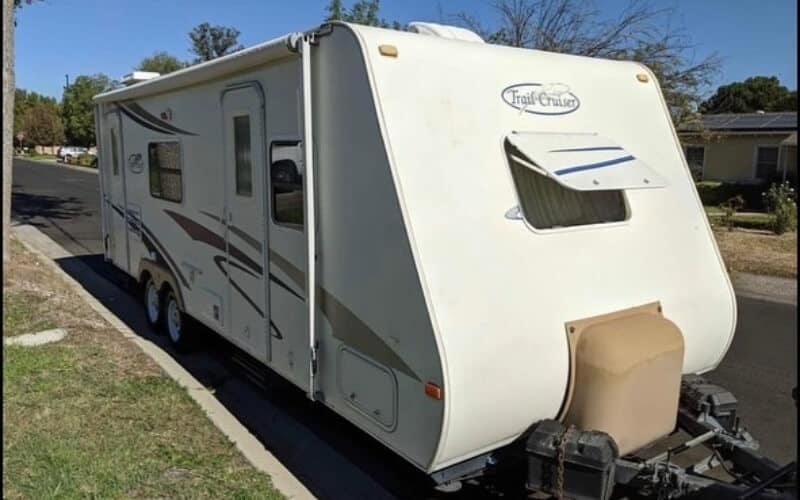
How to park your travel trailer in your driveway
When it comes to parking your travel trailer in your driveway, there are several things you’ll want to be aware of to be sure you don’t get into trouble:
Parking Law of your City
you need to check whether your city has any restrictions on parking a camper in your driveway.
Some cities will limit the amount of time you can park your travel trailer in your driveway. Others will leave it up to your neighbors. And others still will try to ban it all together.
It’s up to you to research the rules for your city because if you get in trouble for not following them, you could pay a major fine.
Home Owners Association (HOA)
If you live in an HOA, the chances are very strong that they’ve made rules about parking campers in driveways.
Sometimes they’ll set a maximum number of days you can store your RV in your driveway. Other times they’ll try to stop you from doing it at all.
And sometimes they just won’t care and you can park your RV in your driveway as long as no one complains.
Either way, if you live in an HOA, be sure to know their rules so you don’t get in trouble with your neighborhood.
Your neighbors
If you have neighbors that can see your driveway, there will be the possibility that they will complain about you parking your travel trailer in your driveway.
Even if you don’t have an HOA or a city that prohibits you from parking your RV in your driveway, angry neighbors can still make life tough for you.
That’s why it’s always a good idea to check with your neighbors before parking your travel trailer in your driveway.
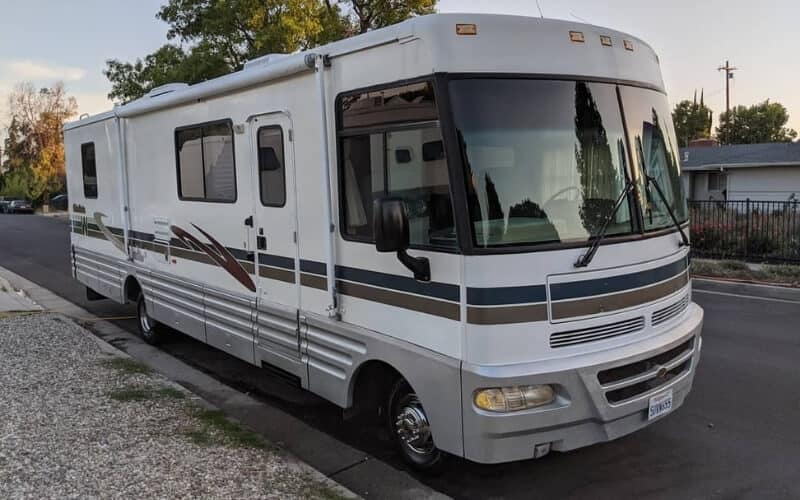
Will your RV fit in your driveway?
Even if you don’t have any rules, neighbors, or city laws preventing you from parking your camper in your driveway, you might still have a driveway that is too small to fit your camper.
You might even think that your driveway is big enough only to realize there was a dimension you didn’t factor in.
That’s why you need to keep in mind the following dimensions to determine if you can park your travel trailer in your driveway:
Length
If your camper is 30 ft. and your driveway is 35 ft. you might think you’re okay. Think again.
What about getting a car in and out? What about your kids who might be using your driveway as a playground? Will parking your travel trailer get too close to a public sidewalk?
In most cases, you’ll want space all around your camper to get other vehicles in and out. You’ll want room for your kids to play.
And you won’t want to upset your city by parking the end of your travel trailer too near a sidewalk.
For these reasons, you need to be sure you have enough length to comfortably park your RV in your driveway.
Width
Much like length, you need to be sure that you have enough width around your travel trailer to not interfere with life around your RV.
Be sure you have enough space to get other cars in and out of your driveway. Enough room for kids to play.
And enough room so your neighbors don’t feel jammed in by the travel trailer you’ve parked in your driveway.
Height
You can park your travel trailer in your driveway as long as it’s not so tall that it’ll hit things like trees, basketball goals, or other obstructions you might have in your driveway.
Driveway slope
If your driveway is too steep, you will scrape the back end of your travel trailer when you try to park it in your driveway.
Most campers simply won’t tolerate a steep slope because the rear end will drag when you try to pull or back your camper into your driveway.
If your driveway has a slope, the best way to handle it is by trying to back your travel trailer in very slowly.
Ask someone to help you by watching as you back your travel trailer into your driveway.
Be sure that the person watching you tells you right away if they think your travel trailer will drag on your driveway because of the slope.
If your travel trailer is going to drag, stop immediately and figure out a different place to park your camper.
The damage that a sloped driveway can cause to your RV is simply not worth the money you might save by not going to a storage unit.
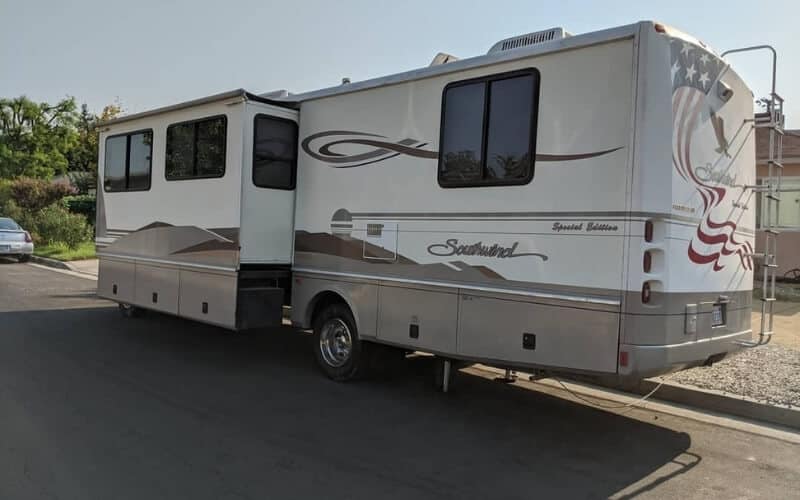
Tips for successfully parking An RV in your driveway
- Talk to your neighbors – The best way to keep neighbors from getting upset is to let them know you plan to park your camper in your driveway and for how long.Be sure to ask them if there is anything you can do so you don’t obstruct their view or otherwise upset them with your camper.
- Keep your camper clean – No one wants to see a dirty, run-down RV parked near them. You can avoid getting in trouble with your neighbors by making sure your travel trailer is clean, in a good state of repair, and doesn’t attract junk around it.
- Don’t block views – Whenever possible, try to park your travel trailer in your driveway so that it doesn’t disturb any views your neighbors are used to. For example, by backing your camper into your driveway, you might be able to get it further back than if you pull it in straight. By backing your travel trailer as far back into your driveway as it’ll fit, you will likely open up the front end of your driveway so that neighbors don’t feel their view is too obstructed.
You Can Keep Your Travel Trailer Plugged in When Parked in Your Driveway
As we mentioned above, one of the best benefits of parking your camper in your driveway is that you can keep it plugged in.
This will allow you to keep your fridge running, your batteries topped up, and even allow you to run a small heater if you need to keep pipes from freezing.
But, if you plan to park your camper in extreme cold for a long period of time, it’s always a good idea to winterize your pipes – even if you run the heat in your RV.
Also remember that household electric plugs aren’t made to run all the energy hungry appliances in your travel trailer.
Be sure to only use the small amount of electricity you’ll need to keep basic RV functions going.
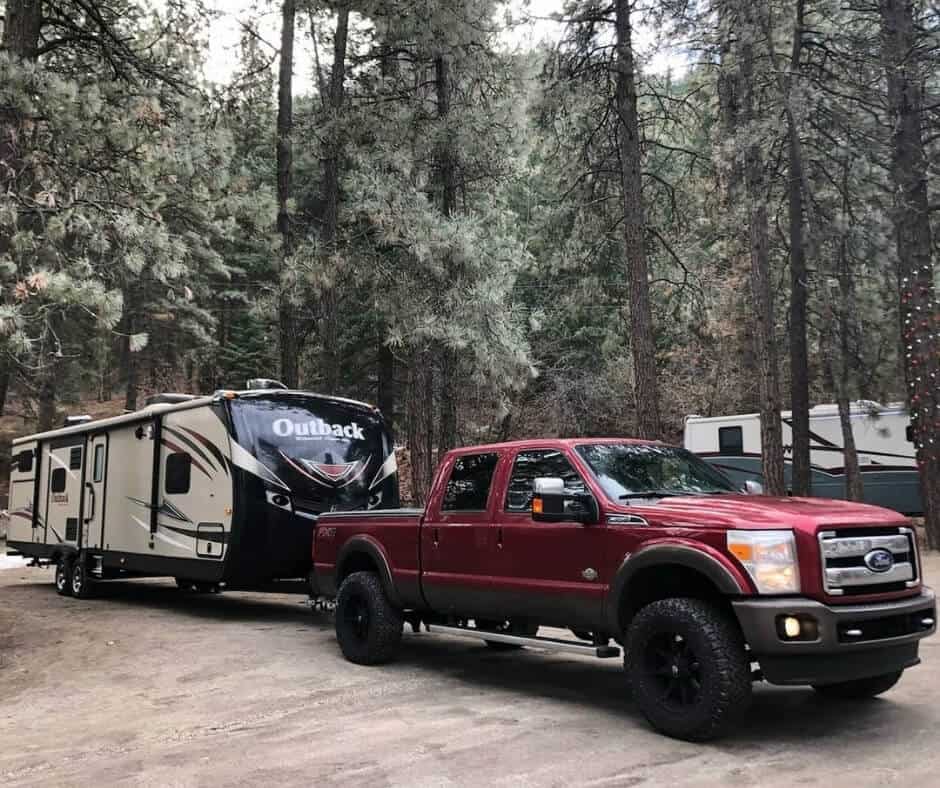
Can’t Park in Your Travel Trailer in Your Driveway and Don’t Want to Pay for Storage? Make Money With It Instead.
If you have feisty neighbors or a rambunctious HOA that won’t let you park your travel trailer in your driveway, there are ways to make money with it.
Sites like Outdoorsy.com and RVshare.com are the Airbnb of camper rentals.
They’ll allow you to rent out your rig to a community of people who have passed DMV checks.
These websites also get you covered with industry leading insurance so you shouldn’t have to pay if someone damages your camper.
Or, if you don’t want people taking your RV on the road, you could consider offering it as a stationary rental on Airbnb.com.
Airbnb actually has a category for Campers/RV now because lots of Airbnb hosts offer campers as tiny homes or guest houses on their property.
Even if you don’t have a property where you could rent out your camper, you could reach out to an Airbnb host to run your camper on their land – in exchange for paying rent or a profit share.
Lastly, you could even offer your travel trailer as a long term rental to someone looking for temporary housing in your area. Just be sure to carefully screen potential renters.
Parking a travel trailer in your driveway can be a great way to save on storage fees, keep an eye on your RV, and to keep your appliances in regular use.
As long as you know what rules to be on the lookout for, your driveway can be a great place to put your camper when you aren’t using it.

